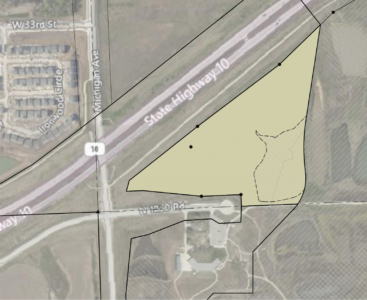In letter, Haskell Board of Regents opposes Baker University land sale and New Boston Crossing development

photo by: Baker University
The highlighted area in this map shows a 16-acre parcel adjacent to the Baker Wetlands that Baker University is considering selling to a developer for an affordable housing project.
The Haskell National Board of Regents is voicing opposition to development in the Wakarusa River floodplain, calling it a “continued assault on Haskell’s historic Wakarusa Wetlands,” and it has requested that Baker University return the wetlands to Haskell Indian Nations University.
The board of regents addressed those issues in a letter sent to Baker University, the developers of the sprawling New Boston Crossing project and the U.S. Army Corps of Engineers, and also shared directly with the Journal-World Thursday. The letter is signed by Brittany Hall, Shawnee, president of the board of regents. Hall told the Journal-World Thursday afternoon that she also shared the letter with the Lawrence City Commission and Douglas County Commission.
In the letter, the board of regents called the 177-acre New Boston Crossing project proposed for the southeast corner of the U.S. Highway 59 and South Lawrence Trafficway interchange and the proposed sale of approximately 16 acres of land just north of the Baker University Wetlands Discovery Center examples of “the continuation of local governmental- and commercial-driven land grabbing.”
“These activities are acts of environmental injustice and a continuation of disregard for wildlife in the Wakarusa River Valley and public health,” the letter reads.
The letter summarizes Haskell’s history with the wetlands, including a period when the wetlands were used to assimilate young Indigenous boys to American agricultural practices while the university was a boarding school known as the Haskell Institute.
The letter notes that the U.S. Department of the Interior initially secured more than 1,000 acres of land for the boarding school, including much of the historic Haskell Wetlands, but chunks of that land by the late 1950s were acquired by local governing bodies and entities like the University of Kansas.
The largest chunk, nearly 573 acres, was transferred to the U.S. Fish and Wildlife Service, and the letter says it was subsequently acquired by Baker University. The letter requests that Baker University return “all their ill-gotten Haskell-Wakarusa Wetlands” to Haskell.
“By the end of the 20th century, approximately 70% of Haskell lands had been given away by paternalistic acts of mismanagement that took precious land secured for the education of the people of our Tribal nations,” the letter reads. “Tribal nations had no part in these decisions — that were made for us — in the bad old days of federal Indian affairs.”
The letter from Haskell’s board of regents makes a few other demands, including that developers conduct ground-penetrating radar studies overseen by the federal Bureau of Indian Affairs and interested Tribal nations on the New Boston Crossing project site. The letter notes that the project site is located relatively close to Haskell, and it’s possible that children might have been buried in unmarked sites within the floodplain.
The letter also requests that the U.S. Army Corps of Engineers consult with the board of regents during its permitting process.
As the Journal-World has reported, Baker University addressed both land development projects in a pair of statements last month. The university noted that the 16-acre parcel of land was under consideration for the development of an affordable housing project, but a land sale had not yet been finalized.
The New Boston Crossing development, meanwhile, is farther along in the process. The Lawrence City Commission approved eight rezoning requests for the project in March, and the project is now seeking regulatory approval from the U.S. Army Corps of Engineers since about half of the project site overlaps with the floodplain.







